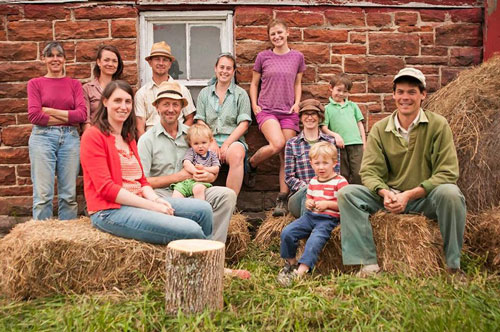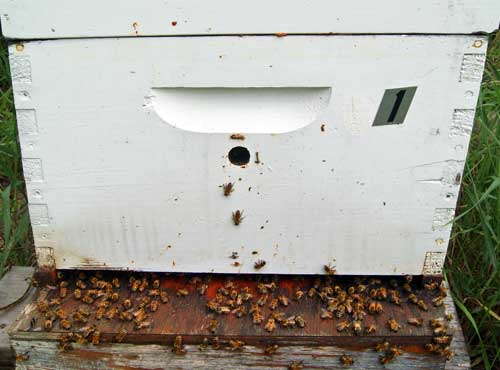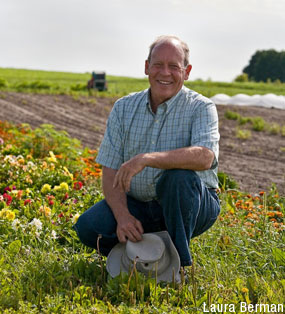Newsletters

Growing Forward 2
Through the recent months I have been studying press releases, attending workshops, and talking with program providers to make sense of all the new Growing Forward 2 (GF2) possibilities. Wide assortments of Capacity Building supports are now available for Ontario farmers. And please note that these are also available to those using Ontario foods (food services, food processors and food distributors). I now look forward to providing consulting services to help build your food business.
Our governments have wisely realized that building local food capacity is a very effective way to benefit all Ontarians. Agriculture and Food is already the province’s largest employer. Soon the Golden Horseshoe and the Greenbelt will surpass the Los Angeles region as North America’s largest food hub. And there will be even more demand for continued growth! Our excellent soils, plentiful water, outstanding climate and knowledgeable farmers can reliably produce exceptionally flavourful ingredients. Our diverse population and extensive infrastructure can consistently process innovative and safe locally grown foods we will enjoy and share with the world.
The GF2 benefits are primarily in the form of 50% Cost Sharing for “Capacity Building” projects and 35% for “Implementation” of projects. Projects deemed to be “Innovative” would be eligible for additional cost sharing. Since “In-Kind” contributions are eligible and supports from other funders are “Stackable”, programs can be accessed by all producers. There are even more generous programs for food service, food processors and food distributors who collaborate with food producers to build the capacity to grow and use special foods.
To qualify for these supports, recipients must demonstrate they are using “Best Practices”. A good demonstration of this is to complete a free two-day Growing Your Farm Profits 2 (GYFP2) workshop. [If you have already taken the GYFP1 workshop, there is sufficient new information for you (and your partners) to retake it in order to more clearly articulate your own business aspirations.] Another best practice is to start working with an Approved Farm Business Advisor. (I am one with extensive sustainable farm experience.)
If you failed to complete all of your GYFP1 Action Plan, you will have to reapply. Previous plans will likely be accepted. But consider the new programs that provide many more options. With the basics in place, start thinking about the many ways you can use training and expert advice to build your capacity to anticipate, understand and plan for demands, opportunities and risks facing your Ontario food business. A few fundable ideas to start your creativity:
- Optimize energy, water and fertility inputs
- Audit and train staff for personal and food safety
- Design market research, website and packaging
- Create a plan for integrated pest management
- Assess labour productivity and provide training
- Create Cost of Production and Cash Flow analysis
- Examine Diversity and Expansion projects
- Develop a formal Business and Marketing Plan
Capacity Building is only the beginning. Implementation has another whole set of supports that I will discuss in a subsequent newsletter. The Greenbelt Foundation is providing additional supports for food hubs and energy reduction. Can’t wait? Give me a call at 705-458-1710 for the latest opportunities.
A Case Study
I am so excited to hear from clients how quickly they have turned their struggling operations into profitable businesses. For example Ian Stutt at Kingston’s Patchwork Garden was able to leave a part-time job and still earn enough to take care of his young family. We did this by converting their cash-accounting to accrual-accounting in order to create accurate Cash Flow projections to assure us their expansion plans could succeed. This conversion also allowed us to analyze their full Costs of Production in order that they could make more effective price, packaging and marketing decisions. To minimize objections from needed price increases, they strengthened their Brand by charmingly telling their story in Youtube Videos.

August 3rd is Canada Food Day
No matter where you are, please do your best to celebrate Canada Food Day. This may be in your own backyard, in a northern wilderness, or in one of the fine participating restaurants – even at Canadian Chef David Garcelon’s Waldorf Astoria in NYC. It is interesting to see which local foods are most appreciated in various parts of the country. Please help build this tradition wherever you are.
The Ontario Table by Lynn Ogryzlo is all about using local food in all seasons. She challenges every household in Ontario to spend $10 a week on local food. Working with the Martin Prosperity Institute at Toronto University, they determined that if every household took up this $10 challenge, it would boost Ontario’s economy by a whopping $2.4 billion. Maybe we should celebrate an Ontario Food Day every week?
More than the Bees have gone!
Our usual 2-dozen barn swallows and 1/2-dozen bats returned in May. But a few weeks later they suddenly abandoned us. Why? They had always taken care of our blackfly and mosquito issues throughout the summers. But this summer we had to wait until the (mosquito-eating) dragonflies multiplied enough to make backyard dining comfortable. Our garden has had to quietly survive with seemingly only one honeybee and one bumblebee. I am waiting to see how well the melons were pollinated by counting the seeds inside them. Despite a healthy patch of milkweed, we have yet to see our first Monarch butterfly. Why?
Living in an area increasingly populated by horses and hay, I had thought that we were immune from all this. While at the 2008 Terra Madre conference in Turin, I attended a session with beekeepers from around the world. Even back then those near conventional agriculture areas were having serious problems; while those in the cities or in the mountains were doing well. For a glimpse of what is happening with bees around the world, view Vanishing of the Bees narrated by the always-delightful Ellen Page.

An innovative way to keep food fresh
Research shows that leaving on your refrigerator light during part of each day increases metabolites that reduce post-harvest pests. [This research appears to be an answer in search of a problem.] But if this also helps to retain nutrient and flavour metabolites, it could become a new “best practice” in kitchens and warehouses around the world. I would like to hear if any chefs expand this research in their own walk-in fridges.
It is very likely that the metabolites that reduce pests are the same as the ones that provide nutrients, flavours and shelf-life found in healthy produce. In collaboration with Ralph Martin, Loblaw Chair of Sustainable Food Production at the University of Guelph, we want to learn techniques to enhance these substances. We have received approval to commence this research through the Dalhousie University Organic Science Cluster. But we continue to wait for the Federal Funding to get started on this valuable research.
The “secret” is Microbes in the soil
For many years I have observed that encouraging microbes to grow in garden soil is the “secret” to superior flavour and extended shelf-life. I could not hope to understand the exceedingly complicated mechanisms by which they accomplish this valuable work. I simply provided them with nutrients (organic matter) and minimized disturbing their activities. In return, I was told over and over again about all the wonderful flavours, that I give them credit for.
I was fascinated to see this article in The Atlantic for summarizing the science behind what good growers and thoughtful eaters continue to enjoy.
| forward to a friend and suggest signing up to receive this newsletter every month. |

